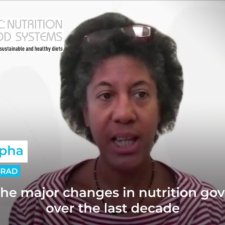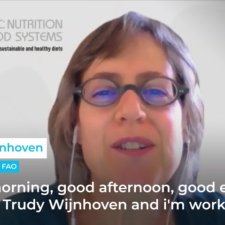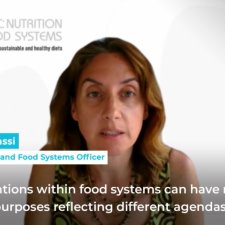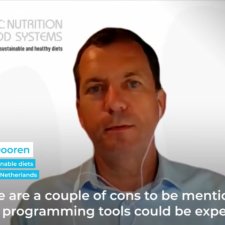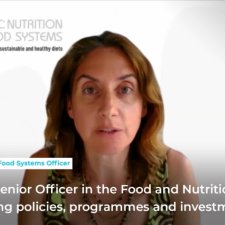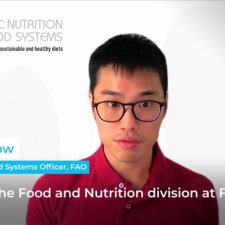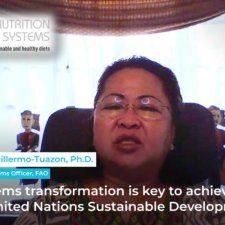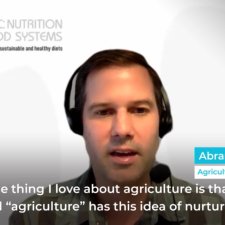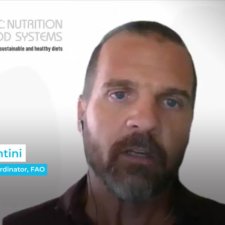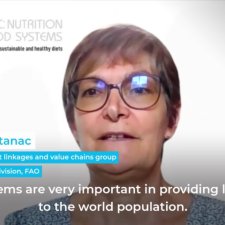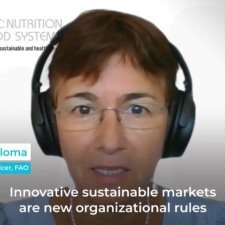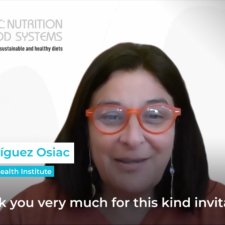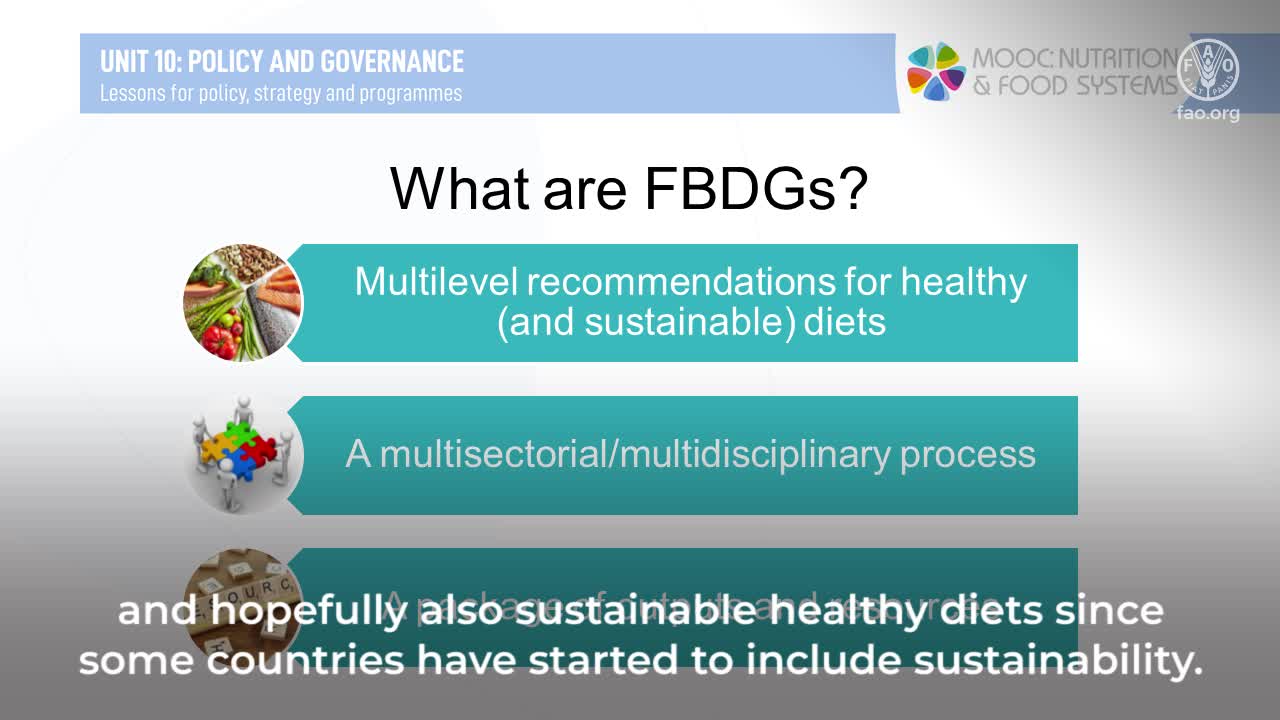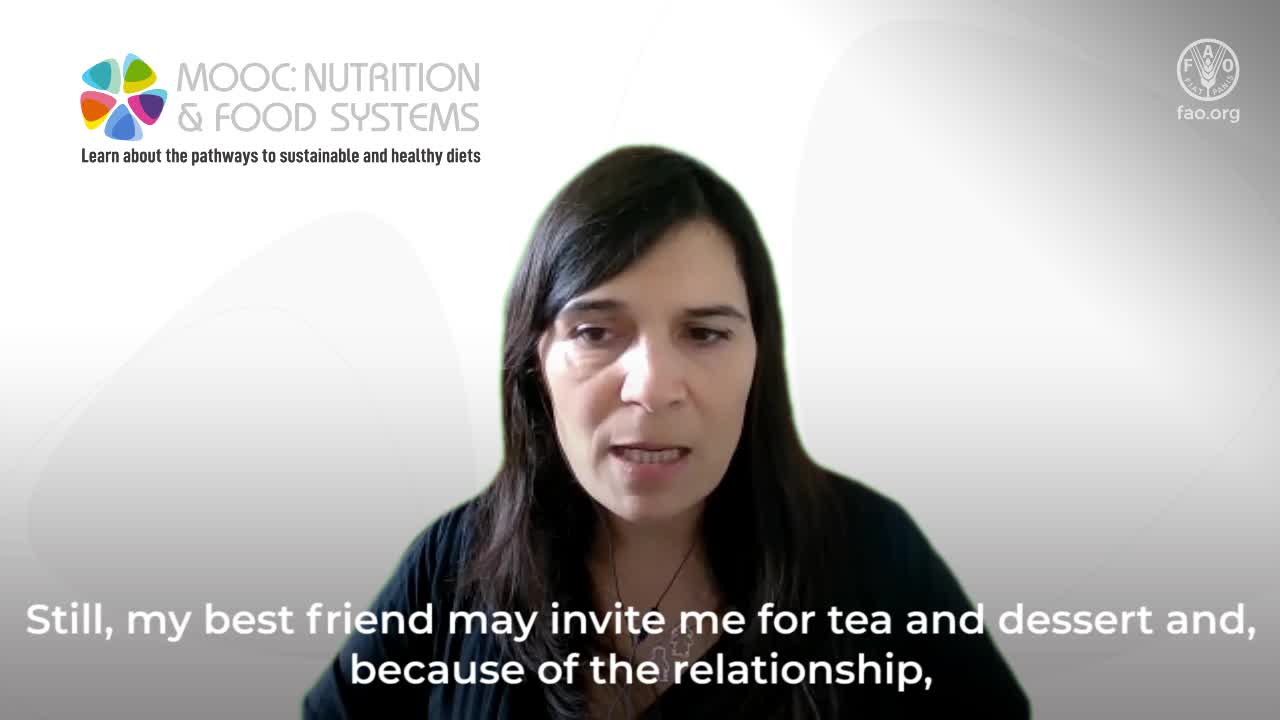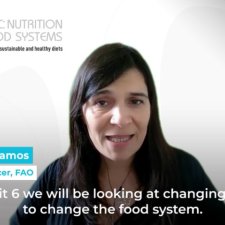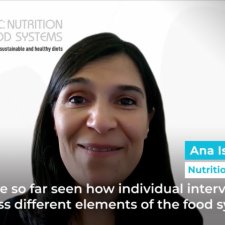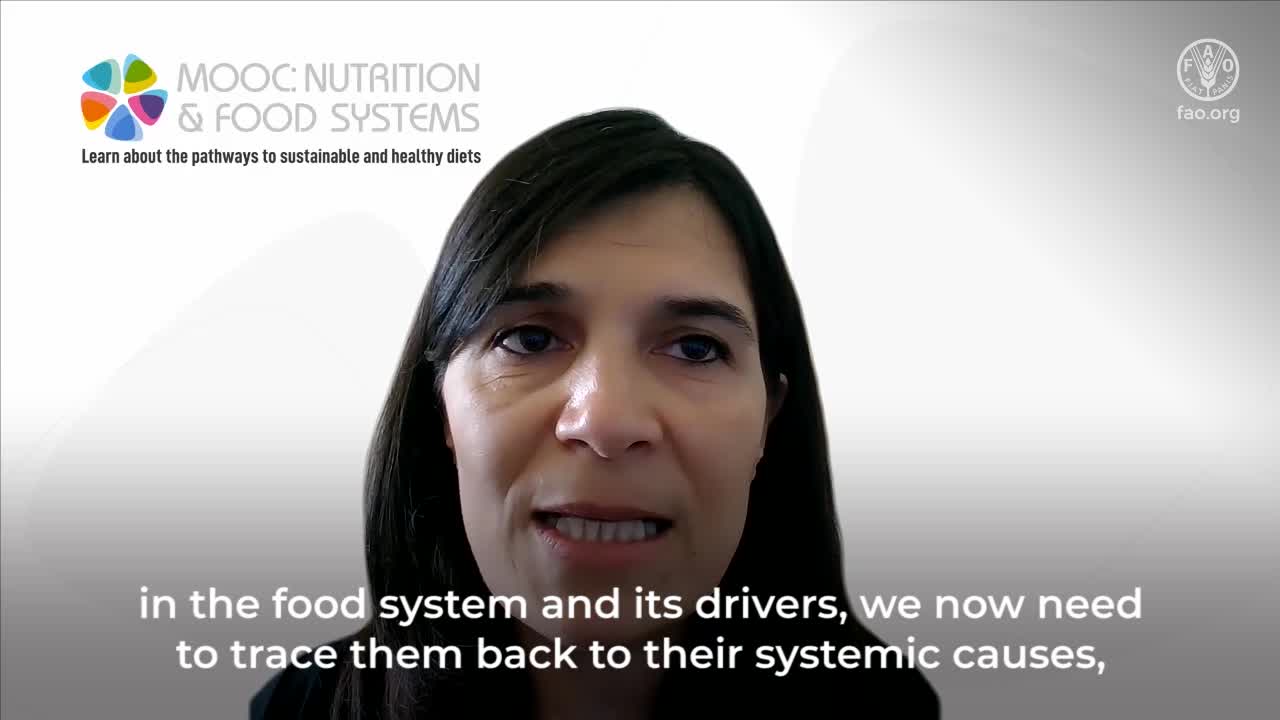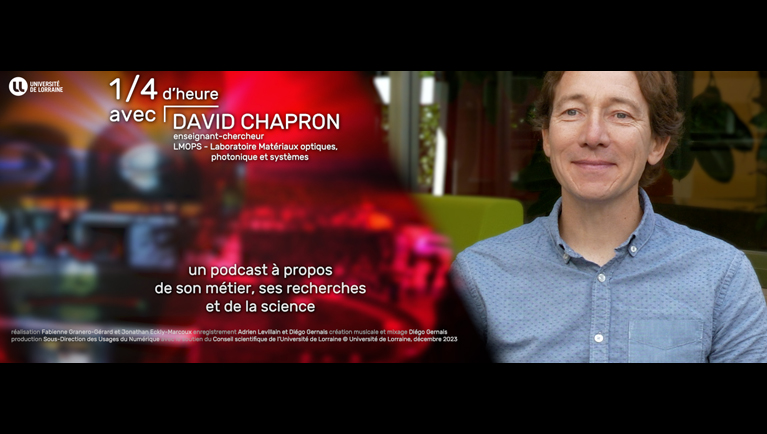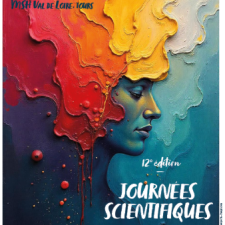Notice
Food-based dietary guidelines (FBDGs) to inform policies and programmes for food system transformation
- document 1 document 2 document 3
- niveau 1 niveau 2 niveau 3
Descriptif
Ana Islas Ramos (Nutrition Officer, FAO) spoke about the use of FBDGs to inform policies and programmes to transform food systems:
1 - what they are (history, evolution, what they are, are not);
2 - general aspects on the development and implementation of FBDGs to inform food systems;
3 - potential of FBDGs;
4 - messages to be retained.
FBDGs are intended to serve as a basis for public policies in the areas of food and nutrition, health and agriculture, and for nutrition education programmes to promote healthy eating habits and lifestyles. They provide advice on foods, food groups and diets that provide populations with the nutrients needed to promote health and prevent chronic diseases.
They involve a systematic multi-stakeholder approach to their development and implementation, as well as to their review and updating. They are aimed at a range of groups: policy makers, professionals or target population groups, ....
FBDGs have great potential to promote healthy and sustainable diets by informing policies and programmes. But they need to be better understood, developed, communicated, used and evaluated. Finally, the SDGs require that FBDGs take sustainability into account.
Intervention / Responsable scientifique
Thème
Dans la même collection
-
Lessons for food system policy, programs and governance – A word from the experts
AlphaArlèneBhattacharjeeLalitaInterview with Arlène Alpha (Researcher, CIRAD) and Lalita Bhattacharjee (Senior Nutrition Advisor, FAO Bangladesh) about food system policy, programs and governance.
-
United Nations Decade of Action on Nutrition 2016–2025
WijnhovenTrudyTrudy Wijnhoven (Nutrition Officer, FAO) gives presentation about the United Nations Decade of Action on Nutrition 2016–2025, also referred to as the Nutrition Decade.
-
Lessons for food system policy, programs and governance
FracassiPatriziaPatrizia Fracassi (Senior Nutrition and Food System Officer, FAO) explains (and gives examples) that interventions within the food systems can have competing priorities that require balancing risks
-
From data to impact – Tools for gathering information and taking decisions. A word from the experts.
Guillermo-TuazonMaria AntoniaVan DoorenCornéInterview with Maria Antonia Guillermo-Tuazon (Nutrition and Food Systems Officer, FAO) and Corné van Dooren (World Wildlife Fund Netherlands).
-
Nutrition-sensitive investment in agriculture and food systems - Budget analysis guidance note
FracassiPatriziaPatrizia Fracassi (Senior Nutrition and Food System Officer, FAO) presents FAO’s work on Budget Analysis for nutrition sensitive investments in agri-food systems.
-
The theory of change in programming for sustainable healthy diets - Understanding the system thinki…
SeowTi KianLorvaoClémentTi Kian Seow (Nutrition and Food Systems Officer, FAO) and Clement Lorvao (Senior Monitoring and Evaluation Expert, FAO) present how to use theories of change and impact pathways to mainstream
-
From data to impact – Tools for gathering information and taking decisions
Guillermo-TuazonMaria AntoniaMaria Antonia Tuazon (Nutrition and Food Systems Officer, FAO) addressed the issue of data collection for planning, monitoring and evaluating the transformation of food systems.
-
Systems approaches to food production and supply – a word from the experts
BickslerAbramPolo GalanteAndreaInterview with Abram Bicksler (Agricultural Officer, FAO) and Andrea Polo Galante, (Senior Nutrition Consultant, FAO) on linkages between healthy diets and food production and the sustainable food
-
The role of urban and periurban agriculture in promoting sustainable food systems
SantiniGuidoGuido Santini (Programme Coordinator, FAO) develops a presentation on the role of urban and periurban agriculture in promoting sustainable food systems in urban areas.
-
Systems approaches to food production and supply
TartanacFlorenceFlorence Tartanac (Senior officer, market linkages and value chains groups, FAO) looks at the definition of food systems and their role in providing a fair livelihood for the world's population.
-
Systems approaches to the food environment - A word from the experts
MattioniDaliaSantacolomaPilarInterview with Dalia Mattioni, Research Associate - FOODTRAILS project - School of Geography and Planning, Cardiff University) and Pilar Santacoloma, Agri-food Systems Officer, FAO, who explain how
-
Systems approaches to the food environment Law on food labelling and advertising: the Chilean exper…
Rodríguez OsiacLorenaDra. Lorena Rodríguez Osiac (Professor, Public Health Institute, University of Chile) presents the experience implemented in Chile on food labelling and advertising.
Avec les mêmes intervenants et intervenantes
-
Recommandations alimentaires pour informer les politiques et les programmes de transformation des s…
Islas RamosAnaAna Islas Ramos (Nutrition Officer, FAO) parle de l'utilisation des recommandations alimentaires pour informer les politiques et les programmes de transformation des systèmes alimentaires.
-
Systèmes alimentaires et nutrition : aider les consommateurs à modifier leur comportement
Islas RamosAnaAna Islas Ramos (Nutrition Officer, FAO) replace les consommateurs/mangeurs au centre du système alimentaire ; elle montre comment les comportements alimentaires influencent le système alimentaire et
-
Food Systems and nutrition : supporting consumers to change their behaviour
Islas RamosAnaAna Islas Ramos (Nutrition officer, FAO) replaces the consumers/eatersat the centre of the food system; she shows how eating behaviours influence the food sytem but vice versa.
-
Pathways, levers, outcomes : making the food system work for better outcomes
Islas RamosAnaAna Islas Ramos (Nutrition Officer, FAO) describes how systems thinking helps going beyond what is immediate and close, stepping back to look at the big picture.
-
Voies, leviers, résultats : faire fonctionner le système alimentaire pour de meilleurs résultats
Islas RamosAnaAna Islas Ramos (Responsable nutrition, FAO) décrit comment la pensée systémique aide à aller au-delà de ce qui est immédiat et proche, à prendre du recul pour avoir une vue d'ensemble du système
Sur le même thème
-
Podcast 1/4 d'heure avec : David Chapron, enseignant-chercheur au Laboratoire Matériaux optiques, …
ChapronDavidRencontre avec David Chapron - enseignant-chercheur au LMOPS (Laboratoire Matériaux optiques, photonique et systèmes).
-
-
05. Se plier en quatre (avec Marie Soulhac)
SoulhacMariePoncetRomainAnimation : Romain Poncet, ingénieur de recherche en sociologie.
-
00. Des comptables et des conteurs (Présentation avec Jean-Philippe Pierron)
PierronJean-PhilippeIntroduction à la série de podcasts "Aux Grands Remèdes les Petits Mots".
-
-
01. Le soin du détail (Avec Emilie Chanel)
PoncetRomainChanelEmilieCe podcast est proposé par la Chaire Valeurs du Soin, animé par Romain Poncet, ingénieur de recherche en sociologie.
-
-
-
-
02. Faire de son mieux (Avec Nathalie Vallet-Renart)
Vallet-RenartNathaliePodcast animé par Romain Poncet, ingénieur de recherche en sociologie.
-
03. Soignants ou Soi-Niant (Avec Sonia Benkhelifa)
BenkhelifaSoniaAnimation : Romain Poncet, ingénieur de recherche en sociologie.
-
Du pot aux recettes : expérimentation de préparations gauloises, romaines, médiévales et modernes,…
Roure-HorardMarie-PierreNous disposons, sur de nombreux sites archéologiques, de céramiques à usage culinaire gauloises, romaines, médiévales et modernes dont les argiles ont enregistré, par imprégnation, les marqueurs


